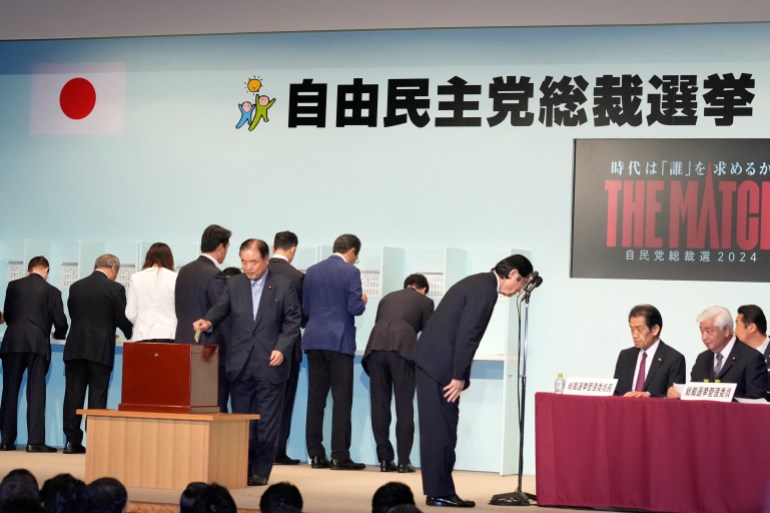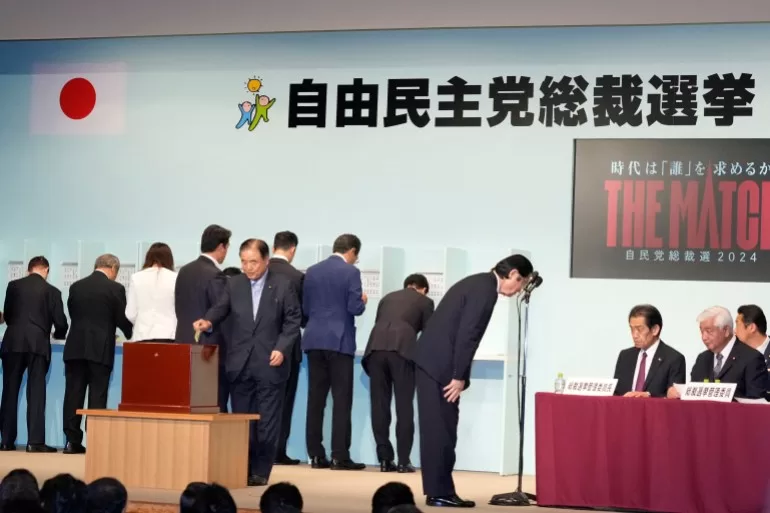The ex-defence minister has won the leadership election of Liberal Democratic Party which holds a majority in parliament.
Shigeru Ishiba has won the leadership election of Japan’s governing Liberal Democratic Party (LDP) and is set to become the country’s next prime minister.
The former defence minister, 67, prevailed on Friday in a tight contest, defeating Economic Security Minister Sanae Takaichi, 63, in a run-off after none of the nine candidates won a majority in the first round of voting earlier in the day.
The final count was 215-194.
“This is a remarkable victory for Ishiba, who is considered as a veteran of the LDP,” said Al Jazeera’s Rob McBride, reporting from Tokyo. “This is his fifth attempt trying to get the LDP’s top job.”
Takaichi would have become Japan’s first female prime minister if she had won the leadership race.
“She’s a fairly renowned, right-wing and hawkish figure, She would have made history not only in the LDP, but also Japan as [the country’s] first woman prime minister,” said McBride, reporting from outside parliament.
Prime Minister Fumio Kishida announced his decision to resign in August amid a series of corruption scandals within the LDP, the largest party in parliament.
The party’s majority in the legislature means the winner of the leadership race is certain to be formally elected as the 65th prime minister by parliament on October 1.
Ishiba is popular with the public but has failed four times to secure the LDP’s top job.
As scandals fuel public discontent within the party, “the tide is in favour of Ishiba and his ‘fair and square’ attitude”, Yu Uchiyama, a University of Tokyo politics professor, said ahead of the election.
In brief comments made to lawmakers before the run-off, Ishiba called for a fairer and kinder Japan and tears welled in his eyes after the final results were read out.
Ishiba’s campaign focused heavily on security issues, and he has indicated he will push for more oversight over the United States’s use of its bases in Japan.
“He is seen as a defence expert. He has proposed the establishment of an Asian-style NATO. And he is likely to continue with more assertive Japan in the international stage,” said Al Jazeera’s McBride.
On the economy, he has questioned the Bank of Japan’s maverick interest rate policy. A former agriculture minister, Ishiba has also called for more efforts to address rural depopulation.
LDP presidents are in office for three years and can serve up to three straight terms.
The LDP has governed Japan almost uninterrupted for decades, with the main opposition parties rarely seen as viable alternatives.
Japan’s new prime minister must face down regional security threats, from an increasingly assertive China and its deepening defence ties with Russia to North Korea’s banned missile tests.
At home, the leader will also be tasked with breathing life into the economy, as the central bank moves away from decades of monetary easing that has slashed the value of the yen.
“The fact that he is something of a maverick, considered as change agent, who has promised to change the party, that may well resonate with a cynical Japanese public,” according to McBride.

